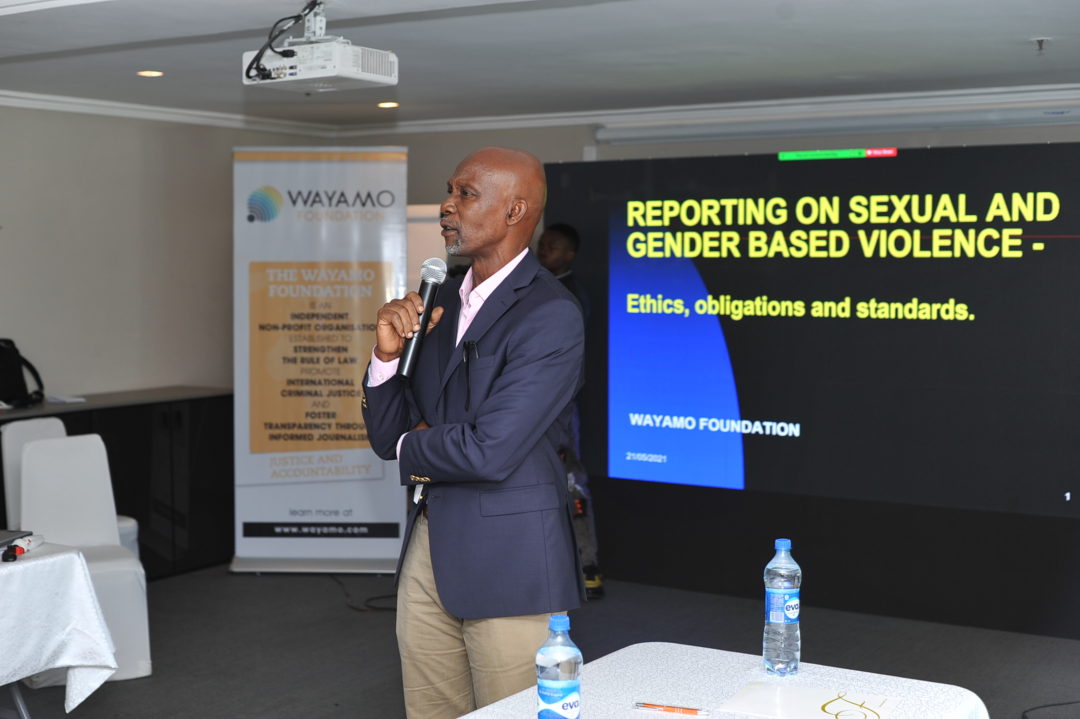Click here for all the event pictures.
On 21 May, Wayamo hosted its third media engagement for journalists who work on issues pertaining to international criminal justice and accountability. The event followed a hybrid model, with journalists attending from Abuja, Nigeria, and the majority of the experts joining via Zoom.
The objective of these meetings is to strengthen reporting skills and build knowledge on critical justice-related issues affecting the region, ranging from the role of the International Criminal Court (ICC) in Nigeria to security challenges and the domestic prosecution of alleged Boko Haram suspects.
The ultimate goal of these engagements is to raise awareness about the importance, not only of accountability for core international crimes on all sides, but also of the role and need for responsible, knowledgeable and accurate journalism.
The meeting was personally attended by a number of journalists affiliated to different Nigerian media houses, including the Voice of Nigeria, Nigerian Television Authority, Daily Trust, News Agency of Nigeria, and Premium Times. Wayamo made every effort to ensure that the participants remained roughly the same as during past engagements, so that conversations could build on prior knowledge and the journalists concerned could become experts in the field.
The event was officially opened by Bettina Ambach, Wayamo Director, and Joseph Roberts-Mensah, Wayamo Africa Director. Their opening remarks were followed by two Zoom sessions: Sofia Candeias, UN Team of Experts on the Rule of Law and Sexual Violence in Conflict, Office of the Special Representative of the Secretary-General on Sexual Violence in Conflict, addressed the investigation and prosecution of conflict-related sexual violence; and Philipp Ambach, Chief, Victims Participation and Reparations Section, ICC, explained how a case moves through the procedural phases before the ICC.
Following a short tea break, Chioma Onuegbu, Deputy Director of Prosecutions and Head of Complex Casework Group (CCG), Federal Ministry of Justice, and Matthew Odu Una, Federal Prosecutor and Head of Secretariat of the CCG, joined the participants in person to brief them on the work of the CCG, including the challenges, limitations and expectations of the media.
After lunch, Joseph Roberts-Mensah conducted an exercise session on ‘reporting sexual and gender-based violence: ethics, obligations and standards’. During the last session of the day, Claus Molitor, Situation Analyst, Office of the Prosecutor, ICC, and Dahirou Sant-Anna, Cooperation Advisor, Office of the Prosecutor, ICC, joined participants via Zoom to provide them with an update on the current Nigeria-ICC relationship, and answered all the questions that the participants posed.
The event was very positively received, with participants describing it as ‘interesting’, ‘helpful’, ‘educating’, ‘well-delivered’, ‘eye-opening’, ‘illuminating’, and ‘highly interactive’. One of the highlights of the day seemed to be the information received on conflict-related sexual violence. As one participant put it, “the workshop gave me more insight into the challenges associated with writing about sexual and gender-based violence. It also highlighted the importance of building trust with the victim/survivor, and reporting with ethical considerations.” Overall, another participant wrote, “Wayamo Foundation training is a ‘must have’ for African journalists who aspire to develop expertise in covering international criminal prosecutions.”
The only considerable shortcoming was apparently the lack of time to address all the topics in which the journalists were interested. In future, participants said that they wished to see additional topics addressed, such as child soldiers, Nigeria’s investigation and prosecution capacity, human trafficking, and how ICC member countries can domesticate the Rome Statute and thereby make investigation and prosecution that much easier.


